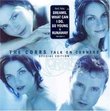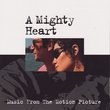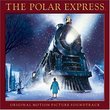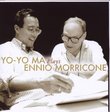| All Artists: Bear McCreary Title: Dark Void Members Wishing: 0 Total Copies: 0 Label: Sumthing Else Music Works Original Release Date: 1/1/2010 Re-Release Date: 2/9/2010 Album Type: Soundtrack Genres: Pop, Soundtracks Style: Number of Discs: 1 SwapaCD Credits: 1 UPC: 669311207722 |
Search - Bear McCreary :: Dark Void
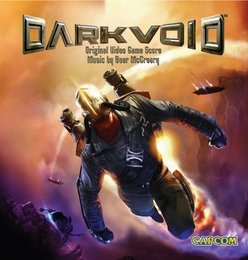 | Bear McCreary Dark Void Genres: Pop, Soundtracks
2010 release containing the soundtrack to the popular video game Dark Void. |
Larger Image |
CD DetailsSynopsis
Album Description 2010 release containing the soundtrack to the popular video game Dark Void. Similar CDs
Similarly Requested CDs
|
CD ReviewsAnother hit from on-the-rise composer Bear McCreary. James Thomas Jeans | Glenwood Acres, TX USA | 02/09/2010 (5 out of 5 stars) "I've been a fan of Bear McCreary's work for a goodly while now, but unlike most people who're familiar with his work, I did not discover the composer via "Battlestar Galactica". I was initially exposed to his work on the Sci-Fi Original series, "Eureka". What Bear does on that show is completely different from what he wrote for his other well known Sci-Fi offerings (namely "BSG" and "The Sarah Connor Chronicles") and is about as far from his work on "Dark Void" as you can get. The musical soundscape of "Dark Void" is broody and evocative, filled with rushing strings, pounding percussion, aggressive bass solos and a hauntingly but beautifully utilized Ondes Martenot (for those unfamiliar with the instrument, think "Dana's Theme" from Elmer Bernstein's "Ghostbusters" score). There's quite literally a little bit of everything here. It's got to feature the most eclectic mix of instruments I've ever heard in a video game score. Speaking of instruments, it's nice to see a video game score that features almost entirely live elements. There's very little in the way of sampling here -- if any at all -- and the production values shine through beautifully. By my third or fourth hour into the game, I found myself thinking that the score must have been a pretty high priority in the budget department. That's not to say the game isn't good, but everything else simply pales in comparison to the music. I have a tendency to replay certain areas with the sound effects and dialog switched off just so I can hear the score. As far as the album is concerned, there's no shortage of music here. At a whopping 79 minutes and 30 seconds, there's no room left to cram anything else on the disc. And best of all, nothing feels recycled or like useless padding. That's not surprising when you consider McCreary wrote around 4 hours worth of material for the game. There is an awful lot going on here, and every single moment was handpicked by McCreary. It's rare that you get a soundtrack album with not a single duff track, but McCreary pulled it off. Kudos to him! My list of highlights include the "Theme for Dark Void" (a leitmotif which is quoted on many occasions throughout the album), "Archon" (the percussion heavy first boss encounter), "Tesla's Laboratory" (heavily featuring the balalaika and, I believe, the panpipes), "Above the Canopy" (if you've played the demo then you've heard this, and the track features one of the most impressive bass solos I've ever heard), and a bonus arrangement of the "Main Theme" performed in the 8-bit style of "Mega Man II". If you've played "Dark Void" and found you love the music, this album is a must-have. Pretty much everything from the score is well represented, and I doubt you'll find yourself left wanting once you've finished listening to it (although I'd be surprised if you weren't tempted to play it again from the beginning). If you've never played "Dark Void" but are a fan of Bear McCreary -- or of sci-fi/action music in general -- then you owe it to yourself to add this beautiful piece of work to your collection. You won't regret it." A Lush Thematic Orchestral Score Takes Us On An Amazing Jour Kaya Savas | North Hollywood, CA | 03/28/2010 (5 out of 5 stars) "Dark Void is a sci-fi video game that features what I found to be an immensely superb score from Bear McCreary. Certain elements to this score give it a classic feel. While listening through I was reminded of Jerry Goldmsith and certain parts reminded me of James Horner.
The score itself is incredibly thematically based. If there was ever a perfect example of theme and variation this would be it. McCreary sets up with the timeless sounding romanticized theme right off the bat. Another big surprise is that we have a full on sweeping orchestral score. Leave your synths at home boys and girls. McCreary successfully sets up an identity for the score even though he used a full orchestra. His wonderful percussion gives the score substance, and his use of ethnic instruments and arrangements give it character. He uses an electric violin to give it a bit of a vintage video game feel. The music here is truly unique in that it doesn't follow traditional gaming standards. Usually what we get from video game scores is "background" music. However here McCreary has given us a grand and lush musical story complete with changing arcs and swelling emotions. The very last track is a complete homage to Mega Man II, which Bear states in the liner notes was one of his first musical influences growing up. So, I thought that was fun of him to include." |

 Track Listings (27) - Disc #1
Track Listings (27) - Disc #1





